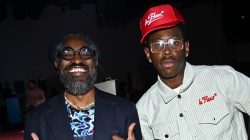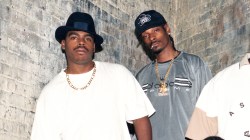Wu-Tang Clan’s 2017 silver anniversary had worthy contributions to their catalog and legacy with releases including Raekwon’s The Wild, Masta Killa’s Loyalty Is Royalty, and the group’s comeback album Wu-Tang: The Saga Continues. Killah Priest is an unsung original Wu-Tang member and the most respected lyricist from their quadruplet offshoot Sunz Of Man. Given the formidable songwriting ability on his solo albums Heavy Mental, Views From Masada, and Planet of the Gods, it’s a natural progression for Priest to select Wu-Tang’s original DJ/studio engineer and Killarmy member 4th Disciple to deliver their first joint project Don’t Sit On The Speakers to return to the essence of what inspired them to become an MC and DJ, respectively.
https://youtu.be/uDBy4CqH3To
For 40 minutes, the 15-track album plays like a 1982 second generation Maxell cassette mixtape fossil. It’s a time machine to when funk, proto-electronica, R&B was the fundamental breakbeats from Hip Hop’s early years. Killah Priest maintains his raspy, guttural flow filled with Five Percent teachings and archaic references of eighties Hip Hop items like British Walker sneakers as 4th Disciple’s turntable wizardry mirror legendary DJs Grand Wizard Theodore and Kool DJ Red Alert.
Song like “KP Supreme (A & B Side)” with its sample of 1970s NYC disco staple “Love Is The Message” and its switch to the time-capsuled increased BPM of the piano medley on the Isaac Hayes classic “Ike’s Mood” show the scientific yet dark horse Killah Priest like a member of Crash Crew harmonizing the short chorus “five days of work” in a playful b-boy persona. “You Don’t Stop” featuring Raekwon impressively has both matching 4th Disciple’s lighting quick turntable wizardry without their cadences falling off.
The chunky bass groove and uptempo drums on “G-Boyz” is where Priest effortlessly drops spiritual and mathematical stanzas in a deadpan manner, “Light can escape black holes in the cosmos/Rap Picasso/Cold like Chicago/Calcium, every ounce of the sun/celestial rhymes, words bounce off the tongue/Kinetic energy, esoteric MC/Hybrid Hip Hop, you high off the weed.” “Moon Crickets” features stellar contributions from Ghostface Killah and Cappadonna and “Disco Airlines” is where Ghostface re-ups the ante for the project. Killah Priest’s channeling of KRS-One reviewing the black culture’s evolution and superiority over an electro-rap era beat serves as a transition from the post-disco to JVC boombox era in Hip Hop. But the album’s momentum is stunted by cacophony-sampled background scratches and Priest’s freestyle cadence that sounds out of sync drowning each other out. The breakneck congo speed of “Last Minutes of Summer,” and “Sativa” Wild Style theme song cuts are also seem too busy to follow with the lyrics on the tracks.
The interludes on Don’t Sit On The Speakers are filled soundbytes of parties that sound like phantom ghosts from Hip Hop’s first generation. Also, there is an overkill with fillers between the tracks containing distorted recordings of brief diatribes and shout-outs by Cormega and Kxng Crooked, and other would-be staged calls into a fictitious radio show on WHBI 105.9 FM, the pioneering station where legendary jocks Mr. Magic and Jazzy Jay on The Zulu Beat Show had brought rap music to the airwaves.
Wu-Tang Clan mastermind RZA stated in a 1995 interview that the group’s mission was to revert rap music to the onstage energy and lyrical mastery of Grandmaster Flash and the Furious Five and the Cold Crush Brothers. Wu’s romanticized mission to venture back to the future has kept dyed-in-the-wool traditionalists eager to ride on the wings of the killer bees on every project they shell out. Killah Priest and 4th Disciple execute this mission delivering pathos of park jam MCs and the smart usage of 1970s breakbeats, disco staples, and rollerskating bounce grooves without sounding too outdated. It won’t convert SoundCloud junkies but the project upholds the crew’s underground aesthetic that has kept them relevant for the past 25 years.







![50 Cent Shares Unseen Diddy Footage From Netflix Documentary: "[It] Shows You His Character"](https://hiphopdx.com/wp-content/uploads/2025/12/50-cent-diddy-documentary-trailer-unseen-footage.jpg?w=250)



This is the first on-point review I’ve read from hhdx in a while.
I disagree with the score because I’m biased, and one line from the review.
I’d say 4 or 4.5 because KP is top 3 dead or alive.
The review cites three of his critically acclaimed albums, but I disagree here. View From Masada and Planet of the Gods are some of Priest’s worst offerings to choose from when highlighting his discography. Masada, especially.
Overall though, good review, Dana Scott.
You wildin’. “Views From Masada” was heat. Early Just Blaze beats, “Whut Part of The Game?”, Canibus’ verse on “Bop Your Head.” Very solid album.
Not just imo, but most diehard Priest fans and professional critics see View from Masada as his weakest album. Two of the best songs, “Fall of Solomon” and “Last Supper” were left off the album. The beats were ok. Lyrically, it was nowhere near KP’s sharpest blades. There’s an old interview floating around out there where Priest details some of the label politics that hindered the album. Basically, they wanted him to make club songs. This is coming from a fan who purchased the majority of Priest’s studio releases. It’s just not that good compared to some of his more focused projects.
PLANET OF THE GODS IS PROBABLE HIS WORST ALBUM HOMIE!! P.W.O.W.R AND HEAVY MENTAL FTW
View From Masada was a terrible follow up to Heavy Mental. I agree with the dudes here. VFM had a couple nice joints on it, but majority of his fans would rank it as one of his weakest albums.
The three or four most critically acclaimed KP albums: Heavy Mental, The Offering, PWOWR, Priesthood.
Personal faves: The Offering, Heavy Mental, Priesthood — in that order.
Black August is my shit
this album was fire!!!
For the old heads, traveling forward to the past ahaha, I like it but I wanted something more futuristic. I agree with the rating!
It’s definitely a top 10 album of the year … with out question
+1
This joint is dope and very creative. Feels like a breath of fresh air. Can’t wait to hear wat else they have coming, i hear they have an ep or full album almost complete…
Fantasic, really surprised me with this one feels like it was made pre 36-chambers 91-92 hip hop party sound!!!
DJDJDJDJDJDJDJDJDJDJ!!
Killah priest is on FIRE right now. This guy keeps getting better and better. I haven’t listen to the new album yet but his last two albums are classic shit. I wasn’t a big killah priest fan but PWOWR AND PLANET OF THE GODS are my joints. Planet of the gods is a slow burn like a blunt. Listen carefully it will blow your mind. DON’T SLEEP! Go cop this new banger. YOU KNOW WU TANG IS FOREVER MOTHERFUCKERS!